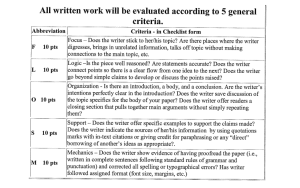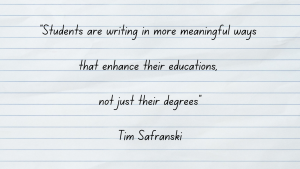
Teaching Writing Using Rubrics
Evaluating student writing can be difficult, and assuring consistent grading from one assignment to the next and between various faculty/TA graders can be particularly challenging. You might ask, why is this? Many factors contribute to the issues we face when evaluating student writing.

Intentional Ambiguity in Assignment Design
When deciding to incorporate writing into a course, most instructors have learned that this is not as easy as “I’ll just assign an essay.” For many, the first step is to determine what the learning objectives are for the writing assignment: what do you want your students to get out of writing this paper?

“We’re all in this together”: Methods for Utilizing Peer Review
Peer review allows students to experience the advantage of feedback not only from the instructor but from their colleagues as well. There are several reasons to recommend employing such an approach, not least of which is a related phenomenon: peer pressure.

Biological Sciences Professor Earns Win Horner Award
Biological Sciences Professor Miriam Golomb sees Writing Intensive (WI) courses as a chance for students to re-examine concepts with a deeper understanding.

WI Class Challenges Students to Collaborate
For Joan Hermsen, teaching a Writing Intensive (WI) class is a collaborative learning process that enhances course content and cultivates an invaluable skill set. Hermsen, department chair for Women and Gender Studies, changed her class Social Research 2950 to a Writing Intensive course last year because she wanted writing products to be the primary assessment.…